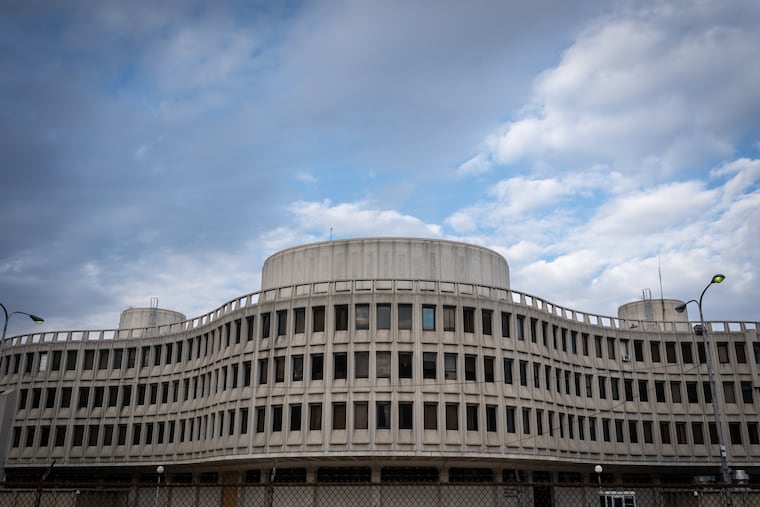Should a building be doomed by its harmful past?
Buildings including a former GOP political machine headquarters, a castle-like Montgomery County prison, and the Roundhouse have been deemed by some to be too tainted to save.

A recurrent argument emerged at Friday’s meeting of the Philadelphia Historical Commission among those who opposed preservation efforts: Some buildings are simply too tainted by their past to save.
The former Police Headquarters known as the Roundhouse and the former Republican Party headquarters from the era of GOP machine rule in the late 19th-through-mid-20th centuries were considered last week for addition to the local historic register. It is difficult to demolish or substantially alter the exterior of buildings thus protected, and critics condemned both efforts because of the troubled histories that unfolded within the structures.
Representatives of the owner of the former GOP headquarters at 1039 Chestnut St., catercorner to MilkBoy, argued that the organization based out of the building had systemically looted the city. Patronage and graft ran amok under Republican rule, earning the city journalist Lincoln Steffens’ disparagement as “corrupt and contented.”
“This is a story not worth telling by the commission,” said Neil Sklaroff, a lawyer with Dilworth Paxton representing the building owner. “The commission should not elevate the corruption that occurred here to normalcy by its telling.”
The new chair of the Historical Commission, affordable housing developer Zachary Frankel, meanwhile argued against the nomination of the former Police Headquarters at 750 Race St. due to the controversial history of the Philadelphia Police Department during the years it was housed in the building.
Although the Roundhouse was championed by liberal mayors with the idea of modernizing the police department, the building quickly became synonymous with the power of Police Commissioner and later Mayor Frank Rizzo.
“When you consider the social aspect, it is tough for me as a preservationist to lump this building into the same category as a place of worship,” Frankel said, “because this building to many, many people does not represent something that is architecturally or historically worth saving.”
A similar argument was mounted last year against a former Montgomery County prison in Norristown, which county and local government sought to demolish. That Gothic castle-like structure was condemned by many city and county politicians — including in commentaries published by The Inquirer — as a monument to incarceration and oppression.
But for many local advocates, arguments against protecting historic sites with sordid histories is seen as ill-considered or a cover for efforts to prioritize profit over preservation.
They note that Germany has preserved some of the architecture of Nazi genocide and tyranny as a permanent reminder about the evils of the past, while closer to home, the Eastern State Penitentiary has been transformed into a museum about incarceration past and present.
“Having visited concentration camps in Germany, having something [standing] but interpreting it properly is much more effective than just having a sign [saying] ‘Bad things happened at this location,’” said Bob Thomas, a commission member and the former chair.
Foes of these preservation efforts shared other rationale behind their efforts.
In their argument against adding the Republican Party building to the historic register, building owner representatives noted its desirable location in the midst of the sprawling Thomas Jefferson health-care campus. They also emphasized the extremely flexible zoning of the site that would allow a variety of uses.
Similarly, Norristown has been going through a real estate investment boomlet in recent years making long-underused property more desirable, and Philadelphia’s Roundhouse sits amid a sea of surface parking lots that represent an enormous development opportunity.
“I think there’s a veneer of ‘the Police Headquarters are bad,’ but in reality, it’s a juicy development opportunity, and we don’t want the Roundhouse standing in the way of that,” said Paul Steinke, executive director of the Preservation Alliance for Greater Philadelphia.
On Friday, the Roundhouse did not receive historic protections because all of Mayor Cherelle L. Parker’s designees voted against preserving it.
But in the other cases, arguments against preserving buildings haunted by history did not win out.
The GOP headquarters at 1039 Chestnut St. was added to the local register Friday with a 9-3 vote, while an immense community organizing campaign in Norristown stayed the execution of the old prison. New uses are being sought for the site by the county government.
A similar campaign was executed by supporters of the Roundhouse, but it failed. For preservationists like Steinke, arguments about the controversial history of the building also ignore a more complex story that many are unaware of. Making the building easy to demolish does a disservice to reformers who sought to change city policing and ensures that fewer people will know about that era.
“Most people don’t know or think about those things nor should we expect them to,” Steinke said, “but that’s where we depend on the experts at the Historical Commission who should be listening to those arguments to make a different decision than they made on Friday.”